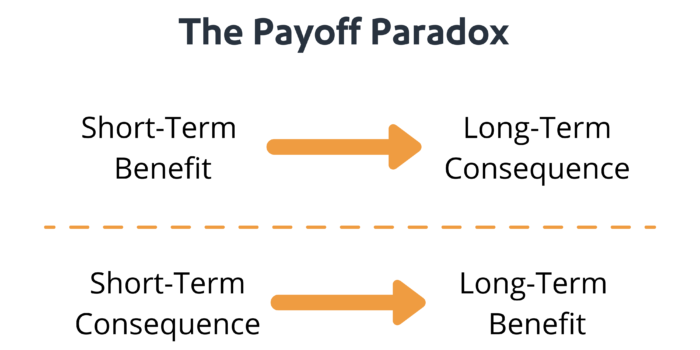I’m excited to share one of my favorite little principles to live by: at work and in my personal life. It’s called The Payoff Paradox. It was a pivotal realization for me, and I hope it will be for you, too!
The idea is that sometimes a decision comes with a short-term benefit, but that short-term benefit is almost always connected to a long-term consequence. For instance, tomorrow morning my alarm will go off at 6:00 a.m. as it always does. At that moment, I’ve got two options: I can either get moving and go work out, or I can go back to sleep. Let’s be honest, going back to sleep feels tempting most mornings! However, if I choose to sleep in day after day, the long-term consequence is a serious detriment to my health and energy. But, because long-term consequences are typically cumulative in nature, we don’t often see the connection and just enjoy the short-term benefit.
On the flip side, I can choose a short-term consequence that’s connected to a long-term benefit. So, continuing with our example, the short-term consequence is that I have to wake up early and stick to my workout routine, which doesn’t feel too good at the moment. But the long-term benefit is that I’m going to be healthier, have more energy, and live longer. Almost always, short-term benefits are tied to long-term consequences that we tend to ignore. Instead of ignoring those, we can choose to endure the short-term consequences because we see the potential for long-term benefits. Choosing to endure the short-term consequence is the paradox that makes the payoff possible!

There are countless things in life that work this way: just think about the short-term consequences of having kids. But, the long-term benefits are endless, and that’s what makes it worth all the short-term challenges and sacrifices.
In the business world, discounting is the clearest example of this principle. The short-term benefit to discounting is that you sell more chicken sandwiches in less time (insert your product name here!). But the long-term consequences can come back to bite: you undermine trust, people aren’t willing to pay full price anymore, and on and on it goes. Numerous consequences can be traced back to discounting, even though it has a tangible and easy-to-see short-term benefit.
But because the consequences of discounting have more of a cumulative effect, you may miss the connection between the immediate benefits and the long-term problems they eventually create. You’re only focused on hitting the target, meeting the deadline, or selling the sandwich TODAY. Believe me, I know just how tempting immediate gratification can be in the moment!
In today’s world, rejecting something that comes with a clear short-term benefit, like discounting, is counterintuitive, especially for publicly traded businesses that think in 90-day cycles. We’re laser-focused on that short-term benefit that pays off in the next 90 days. But ultimately, that doesn’t create what we really need: a win for the customer AND a win for the business. So, the better question is…do you want to be successful in the short run or for the long haul?
Apple is a great example of a company that has had to endure short-term consequences for long-term benefits. When everyone else was slashing their prices, Apple chose not to give discounts and now, no one even looks for discounts on their products. Apple has to compete against companies that are handing out discounts like candy. So, they have to give up something in the short run when some customers who are very price sensitive go buy something else – something cheaper. Apple has been willing to withstand that pressure in order to get to the long-term benefit that ultimately people feel like their product, even though it’s more expensive, is a better value. Because the price is the same no matter where you buy their product, it has enabled them to create value and have customers look for value in places where it counts: the product and the customer experience. From the experience of buying in the Apple store, the constant innovations, the customer service, and the knowledge and passion of the employees, to the Genius Bar, the sleek packaging, the in-store classes, and instruction to enhance the use and benefits of the product, every touch point has tremendous value that customers are willing to pay for. The result? The customer knows they can’t get that better-value product any cheaper, so they stop using price as a criterion when choosing what to purchase.
We must be willing to endure the short-term consequence in order to obtain the long-term benefit. That is the Paradox and THAT is the Payoff! If you start to think about it that way, you can begin to use this paradox to your advantage in every area of your life – in marketing and otherwise!
When I think about principles that really worked well at Chick-fil-A, they’re almost always tied to taking a short-term consequence that will get us to a long-term benefit. Closed on Sunday is another great example. There are certainly a lot of short-term consequences to that choice. But even decades after making that decision, the organization is enjoying the long-term benefit.
Simply put, The Payoff Paradox is this: All of us want short-term benefits. But for every short-term benefit you take, you’re likely to get a long-term consequence. However, the inverse is also true: for every short-term consequence you endure, a long-term benefit is right around the corner. If you’ve heard of buy one get one (BOGO), you’ll like this: buy a short-term benefit and get the long-term consequence for free! Wouldn’t you rather have benefits that are realized in…and last for…the long term? Because we have to live in the long term too!
